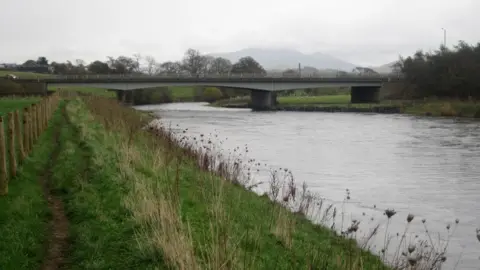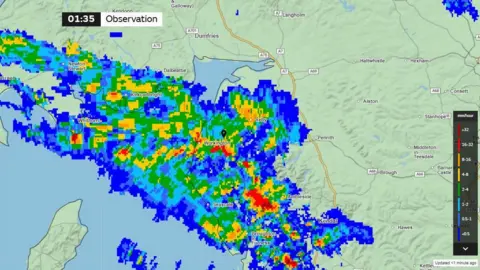Sewage discharged into river after heavy rainfall
 Geograph/Graham Robson
Geograph/Graham RobsonA campaign group has described sewage being spilt into a river for more than six and a half hours as "shocking".
Sewage began being released from the storm overflow at Cockermouth Waste Water Treatment Works, in Cumbria, at 04:46 BST on Monday and continued to do so for six hours and 39 minutes, according to United Utilities' website.
James Luxton of Surfers Against Sewage blamed underinvestment for the prolonged spill and said the water company was using the "same old tired excuses" to justify the discharge.
United Utilities said the tank was discharging because the area had experienced "heavy rainfall overnight" and the site was operating within its permit to prevent flooding.
Mr Luxton said: "Shocking events like these are the result of years of chronic underinvestment and symptomatic of a system that prioritises pay-outs and bonuses instead of the public good."
Matt Staniek, founder of the Save Windermere group which campaigns against sewage spills in the Lake District, said it was cheaper for water companies to "dump" sewage rather than treat it.
"People should be asking where their money has gone, and why it hasn't been invested to prevent this from happening," Mr Staniek said.
 The Met Office
The Met OfficeThe overflow tank is located by the River Derwent near Papcastle Bridge.
The Met Office's rainfall map shows Cockermouth and the surrounding area experienced about five hours of rain, starting from midnight.
Most areas received low levels of rainfall but small patches experienced high levels, upwards of 16mm (0.6in) per hour.
A United Utilities spokesman said storm overflows were permitted to operate after heavy rainfall to "avoid the flooding of homes and businesses".
He said there had been a 31% reduction in spill duration in 2024 with the company "committed" to driving down the number of times storm overflows were used.
The spokesman said the firm was "embarking on the largest ever investment programme in our infrastructure" which would see the "biggest overhaul of the region's sewer network in a century".
